INTERVIEW: FIRE & DUST MEETS AMY RUGG
‘…And the question mark-ed man
Stood up straight and
Clenched his jaw
Closed his quotations
Revoked his law…’
_________________________–Amy Rugg
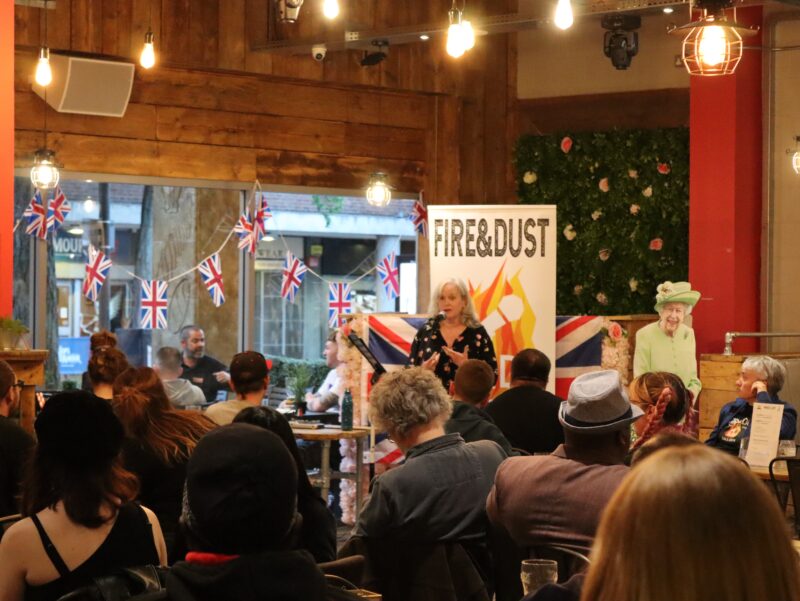
Photography credit: Tracy Morris
Amy Rugg is a talented writer, poet, collector of stories, teller of tall tales – and a highly valued member of the Fire & Dust community, who is always full of support and encouragement for other people. She says poetry, both her own and by others, is the fresh air that keeps her going, and she is inspired by listening to a wide variety of other artists. Being a dual citizen of the U.S. and UK, Amy enjoys writing and performing from the unique perspective of a relative outsider. She is a champion of Coventry city, taking inspiration from family, nature, history, and working life, and enjoys experimenting with the threshold of poetry and prose. Amy was selected to perform at the recent ‘When Poetry Meets Music’ event for Positive Images festival and her published poem was featured in our Spirit of Fire & Dust anthology published by Allographic.
Amy was our Fire & Dust headliner at Café Morso on 2nd June 2022. Her set delighted the crowd, and we caught up with her after the gig, to ask a few questions…
HCE: Tell us a little about your background and journey as a writer so far. What inspired you to start creating and performing poetry?
AR: My first performance, according to my family, involved my patiently picking the lock my dad invented to secure the toddler gate across the front porch steps. Toddling out into the middle of the busy urban rush hour to deliver the ‘set’, I put my head back and started shout-singing in the road ‘On-ya-day, you people!’ and waving my arms wildly. I was eventually yanked off the ‘stage’ by my mother who put me on the kitchen ‘chair of incarceration’ until the impulse to run out into traffic eventually passed. I like to think I was one of punk’s early adopters.
I can’t remember when I started telling stories or making up songs, it was always part of how I communicated; I bobbed happily around in the creative soup of our loud, social, working-class family who were natural storytellers, artists and musicians, despite working jobs where that creativity was shelved or ignored.
Writing things down didn’t really happen until I was around eight, when my amazing teacher, Miss Clifford, patiently helped me stop running around hyperactively and un-cramped my uncooperative left hand. My imagination shot out onto the lined page and I was hooked. My family had a mixed reaction; my parents were pleased that I’d inherited my mother’s writing talent, but anxious that I keep my creativity as a hobby and get a ‘real’ job – but not a traffic cop, obviously (on account of my earlier attempts at traffic calming).
As an adult with a family of my own, I stopped writing altogether for about 20 years. Then a friend recommended I attend a free writing course run by BBC Coventry & Warwickshire. There I met the enormously talented Alex Johnson, who challenged everyone on the course to write well. She said, ‘You have talent – what will you do with it?’ That inspired me – that someone believed in me. We all got to record our stories and my story ‘Soul School’ was broadcast on the radio.
Most of the poetry I have written has been as an adult, mostly after joining ‘Fire&Dust’ which I think of as my ‘poetry night school’.
HCE: Who is your work aimed at – do you have an ideal audience in mind when you’re putting a poem together?
AR: I’m usually talking to myself – either addressing my younger self or just letting off steam to the person I am now. After that, I gear things towards the people I’m with – my children, work colleagues, friends or neighbours or others: trying to make a connection.
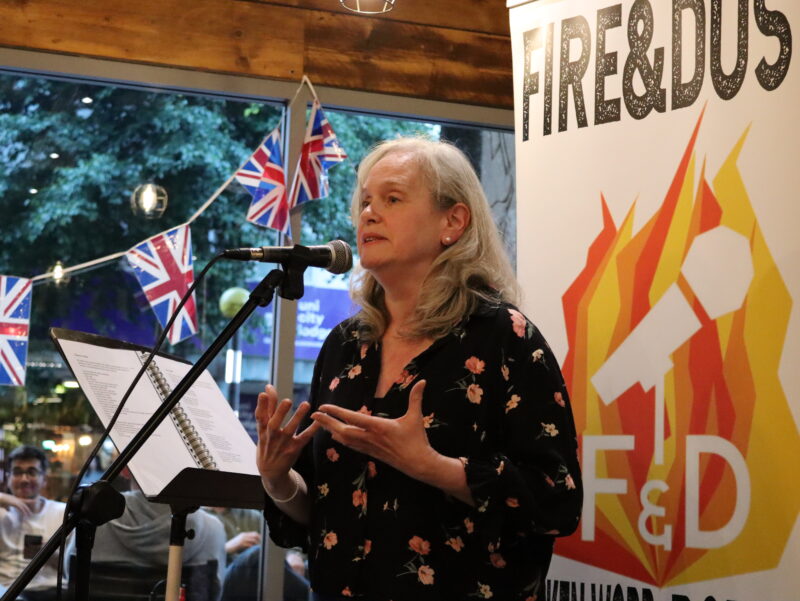
Photography credit: Tracy Morris
HCE: Would you say there are themes or motifs that you gravitate to in your work?
AR: My writing inevitably contains observations of where I come from and where I am now or things I’m curious about: nature, current events, connections between people no matter how different they first appear. The eternally full laundry basket and the empty fridge. The feel of my feet in wellies. A tiny bird that comes into my garden.
HCE: There’s often a spark of humour in your poems. How important a device do you think humour is, and what role do you believe it plays in poetry?
AR: Humour is an essential device; it can be used to catch the reader off guard, create mutual understanding, playfulness, contrast. It can be used to express outrage or irony or disbelief. Humour is my medicine.
HCE: Your Fire&Dust performance was well-structured, with stories in-between the poems for smooth, compelling transitions. Could you share a top piece of advice for other poets, re: preparing a headline set and keeping the audience engaged?
AR: Take your time. Breathe. Try to relax. Make some eye contact. Talk into the mic. Let the poetry out. Speak to people and assume that if they are sitting quietly and listening, then, they want to hear you out.
HCE: There’s a beautiful musicality to your performances – including one poem with audience participation that literally has a clap-along beat running through it! How do you achieve this level of rhythm and flow? For instance, do you read aloud a lot during the writing process?
AR: Several of my poems have emerged out of a short, rhythmic phrase I’ve heard in nature or in machines or heard someone else say. I wrote ‘My grandpa always kept the beat’ from the repetitive sound of my shoes on the pavement on a morning walk. I got a poem once out of the noise made by the rinse cycle on my dishwasher. Once I’ve written something, I read it out loud to myself and play around with the sounds. Some poems seem to flow better when they are read silently and others when they are performed.
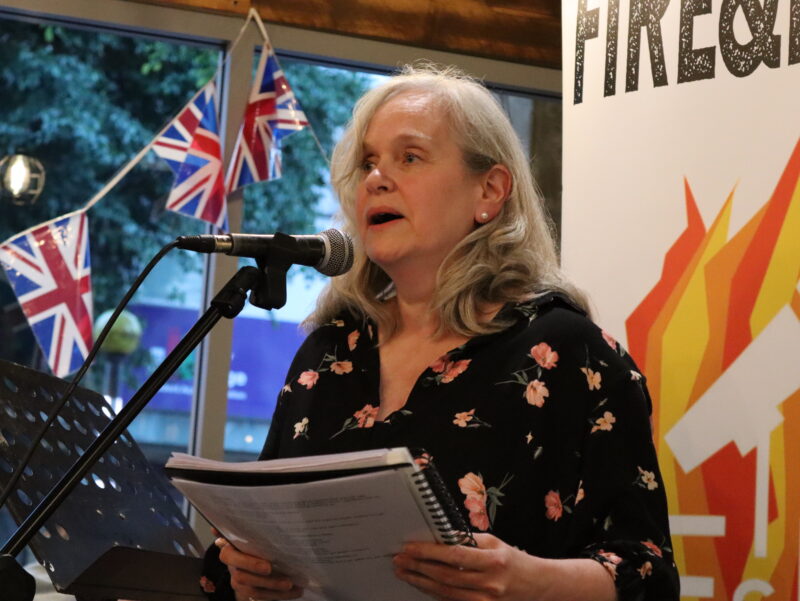
Photography credit: Tracy Morris
HCE: What do you feel most well-written poems have in common?
AR: Good poetry rings true – emotionally or literally. Descriptive imagery. Hearing the poet’s unique voice. Good poems grab your eyes and your heart, unseat you – push you over – and pick you up again.
HCE: In your experience, are both Rochester and Coventry good places to be a writer, and do these cities have thriving literary scenes?
AR: I think wherever you are in the world is a great place to be a writer, because there is always something new, some changing thing to observe and fold into your creativity. Coventry is growing its creative communities and that’s exciting; to be around in the early days of something like that is exhilarating – one day in the future I will be able to look back and say, ‘I was there when it all started’. We may only have one monthly poetry open mic, but it’s Fire&Dust, so what we lack in quantity we more than make up for in quality. Rochester is a bigger city and so has a bigger arts scene; apparently it was named the 17th most arts-vibrant city in the country by the National Centre for Arts Research. But I haven’t lived there for many years and Coventry’s given me the most opportunities to grow.
HCE: Have you attended many poetry events over in the States; if yes, have you observed any standout differences between gatherings over there and in the UK?
AR: Having attended a smattering of poetry readings in the US as a college student, I think the main difference is that here, people are funnier and more self-deprecating. I think the UK might be the irony capital of the globe.
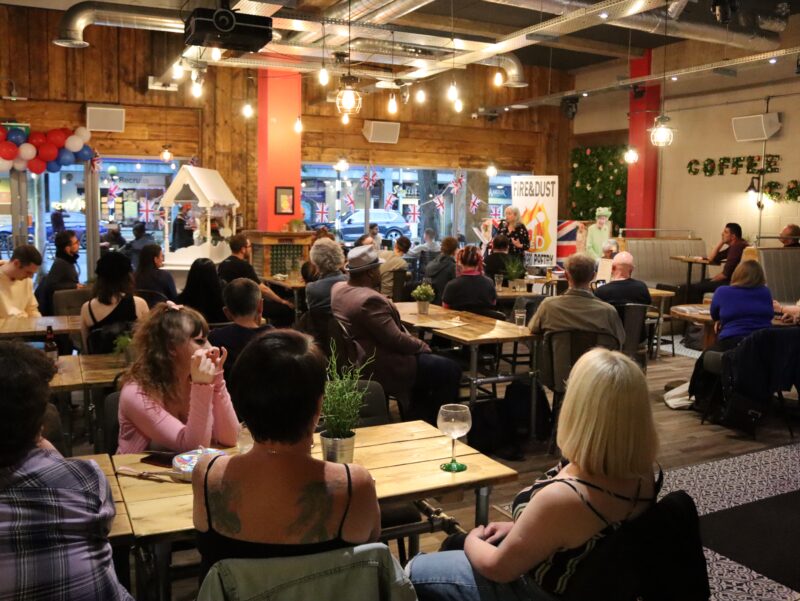
Photography credit: Tracy Morris
HCE: What type of poetry do you seek out for personal enjoyment? As a reader/listener, when you engage with a poet’s work, what are you hoping to get out of it?
AR: Hearing a huge range of different poetry styles and performances by local poets is very satisfying and enjoyable. I’m huge fans of local poets Jane Commane, Navkiran Mann, Danger Mouse and Ann Atkins.
I love Kae Tempest’s ’Brand New Ancients’; Robert Frost’s ‘Road Not Taken’ and ‘Two Tramps in Mud Time’; Maya Angelou’s ‘Phenomenal Woman’; Emily Dickinson saying ‘When I read a poem I need it to physically rip my head off’; Benjamin Zephaniah’s fun, naughty, powerful and lovingly challenging work makes me laugh and cry.
HCE: Who or what would you say are the biggest influences on your poetry?
AR: Other poets and people generally, the great outdoors, memories of the past and direct experience of the present. Also, life’s challenges – parenthood, working life, illness, hard times, and the noise of life around me. As a young person I was inspired by Edward Lear, the genius nonsense poet and Shel Silverstein, the fabulously wicked children’s poet. One day, if I work hard, maybe I will write something as awesome as ‘Sarah Cynthia Silvia Stout Would Not Take the Garbage Out’ and die a contented woman.
HCE: You are very good at telling narratives in poems that end on a satisfying note without spoonfeeding the audience. Is it difficult choosing the best place to stop?
AR: Lots of my poems get a trim before they are finished. There often seems to be a section that can be cut out entirely, leaving a few threads that tell the reader all they need to know.
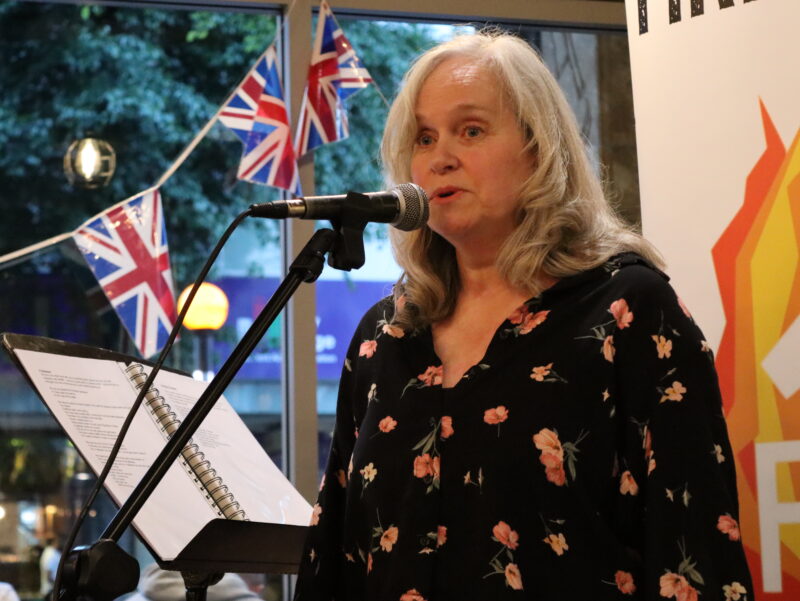
Photography credit: Tracy Morris
HCE: What’s next on the horizon for you? Are you already working on projects/booked for upcoming performances?
AR: This year my goals are to try to attend more poetry workshops, write more poems and then use these to create a show with stories, poems and funny slides. We’ll see…
HCE: What’s the best way for people to keep connected with you and your work, or contact you for bookings?
I don’t have a poetry presence on the internet – only my personal accounts – but these are okay to share:
HCE: Is there anything we didn’t cover that you’d like to share with our readers?
AR: Just thank you for the opportunities to write, perform and grow.
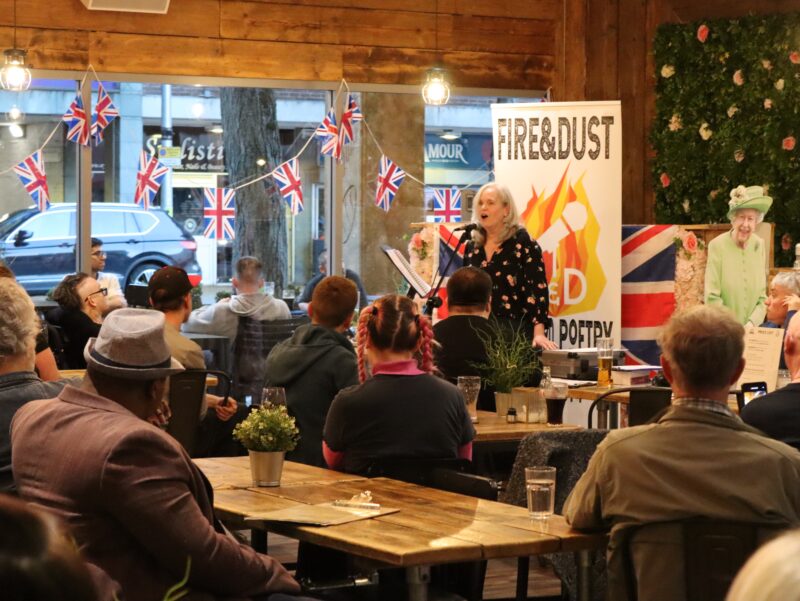
Photography credit: Tracy Morris
